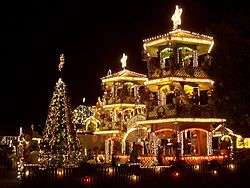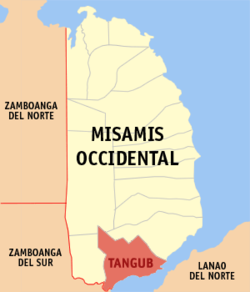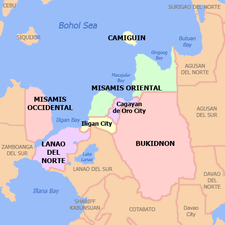Tangub
Tangub, officially the City of Tangub (Cebuano: Dakbayan sa Tangub; Tagalog: Lungsod ng Tangub), is a 4th class component city in the province of Misamis Occidental, Philippines. According to the 2015 census, it has a population of 63,011 people.[3]
Tangub | |
|---|---|
| City of Tangub | |
 | |
 Seal | |
| Nickname(s): Christmas Symbols Capital of the Philippines | |
 Map of Misamis Occidental with Tangub highlighted | |
OpenStreetMap 
| |
.svg.png) Tangub Location within the Philippines | |
| Coordinates: 8°04′00″N 123°45′00″E | |
| Country | |
| Region | Northern Mindanao (Region X) |
| Province | Misamis Occidental |
| District | 2nd District |
| Cityhood | June 17, 1967 |
| Barangays | 55 (see Barangays) |
| Government | |
| • Type | Sangguniang Panlungsod |
| • Mayor | Jennifer W. Tan |
| • Vice Mayor | Alberto C. Peñas |
| • Congressman | Henry S. Oaminal |
| • Electorate | 40,080 voters (2019) |
| Area | |
| • Total | 162.78 km2 (62.85 sq mi) |
| Population (2015 census)[3] | |
| • Total | 63,011 |
| • Density | 390/km2 (1,000/sq mi) |
| • Households | 12,868 |
| Economy | |
| • Income class | 4th city income class |
| • Poverty incidence | 35.47% (2015)[4] |
| • Revenue (₱) | 406,825,376.70 (2016) |
| Time zone | UTC+8 (PST) |
| ZIP code | 7214 |
| PSGC | |
| IDD : area code | +63 (0)88 |
| Climate type | tropical climate |
| Native languages | Subanon language Cebuano Tagalog |
| Website | tangubcity |
The city was formerly called Regidor until 1930 when it was given its current name.[5]
Geography
Tangub is located on the northern shores of Panguil Bay.
Barangays
Tangub is politically subdivided into 55 barangays.
- Silanga
- Aquino (Marcos)
- Santa Maria (Baga)
- Balatacan
- Baluk
- Banglay
- Mantic
- Mingcanaway
- Bintana
- Bocator
- Bongabong
- Caniangan
- Capalaran
- Catagan
- Barangay I - City Hall (Poblacion)
- Barangay II - Marilou Annex (Poblacion)
- Barangay IV - St. Michael (Poblacion)
- Isidro D. Tan (Dimalooc)
- Garang
- Guinabot
- Guinalaban
- Hoyohoy
- Kauswagan
- Kimat
- Labuyo
- Lorenzo Tan
- Barangay VI - Lower Polao (Poblacion)
- Lumban
- Maloro
- Barangay V - Malubog (Poblacion)
- Manga
- Maquilao
- Barangay III- Market Kalubian (Pob.
- Matugnao
- Minsubong
- Owayan
- Paiton
- Panalsalan
- Pangabuan
- Prenza
- Salimpuno
- San Antonio
- San Apolinario
- San Vicente
- Santa Cruz
- Santo Niño
- Sicot
- Silanga
- Silangit
- Simasay
- Sumirap
- Taguite
- Tituron
- Tugas
- Barangay VII - Upper Polao (Poblacion)
- Villaba
Climate
| Climate data for Tangub City, Misamis Occidental | |||||||||||||
|---|---|---|---|---|---|---|---|---|---|---|---|---|---|
| Month | Jan | Feb | Mar | Apr | May | Jun | Jul | Aug | Sep | Oct | Nov | Dec | Year |
| Average high °C (°F) | 29 (84) |
30 (86) |
31 (88) |
31 (88) |
30 (86) |
30 (86) |
29 (84) |
30 (86) |
30 (86) |
30 (86) |
30 (86) |
30 (86) |
30 (86) |
| Average low °C (°F) | 22 (72) |
22 (72) |
22 (72) |
23 (73) |
24 (75) |
24 (75) |
24 (75) |
24 (75) |
24 (75) |
24 (75) |
23 (73) |
23 (73) |
23 (74) |
| Average precipitation mm (inches) | 69 (2.7) |
58 (2.3) |
67 (2.6) |
60 (2.4) |
109 (4.3) |
114 (4.5) |
83 (3.3) |
78 (3.1) |
76 (3.0) |
92 (3.6) |
86 (3.4) |
63 (2.5) |
955 (37.7) |
| Average rainy days | 12.8 | 11.6 | 14.8 | 17.4 | 24.8 | 23.5 | 20.7 | 18.5 | 17.4 | 22.5 | 21.6 | 15.6 | 221.2 |
| Source: Meteoblue [6] | |||||||||||||
Demographics
|
| ||||||||||||||||||||||||||||||||||||||||||
| Source: Philippine Statistics Authority[3][7][8][9] | |||||||||||||||||||||||||||||||||||||||||||
In the 2015 census, the population of Tangub was 63,011 people,[3] with a density of 390 inhabitants per square kilometre or 1,000 inhabitants per square mile.
Festivals
Tangub, through its Sinanduloy Cultural Troupe, is a regular participant of the Sinulog Festival, a festival held in Cebu City. This festival is the pageantry of sights, sounds and colors as it honors and pays homage to the patron saint of Cebu, Sr. Santo Niño, the child Jesus. The highlights of the festival is from January 9–18, yearly. Tangub City has won a record of twelve grand champion streak in the Sinulog-Based Category of the festival.
Through the recent years, Tangub has been popularly dubbed as the Christmas Symbols Capital of the Philippines.
Tangub City has its own festival - Dalit Festival. It is in honor of the city's patron saint, Saint Michael the Archangel. It is celebrated every 29 September-the feast day of St. Michael. It is participated by the city's baranggays through clusters represented by local schools.
Sister cities of Tangub


See also
- List of renamed cities and municipalities in the Philippines
References
- "City". Quezon City, Philippines: Department of the Interior and Local Government. Retrieved 30 May 2013.
- "Province: Misamis Occidental". PSGC Interactive. Quezon City, Philippines: Philippine Statistics Authority. Retrieved 12 November 2016.
- Census of Population (2015). "Region X (Northern Mindanao)". Total Population by Province, City, Municipality and Barangay. PSA. Retrieved 20 June 2016.
- "PSA releases the 2015 Municipal and City Level Poverty Estimates". Quezon City, Philippines. Retrieved 12 October 2019.
- History and Heritage, City Government of Tangub, retrieved 2012
- "Tangub: Average Temperatures and Rainfall". Meteoblue. Retrieved 29 April 2020.
- Census of Population and Housing (2010). "Region X (Northern Mindanao)". Total Population by Province, City, Municipality and Barangay. NSO. Retrieved 29 June 2016.
- Censuses of Population (1903–2007). "Region X (Northern Mindanao)". Table 1. Population Enumerated in Various Censuses by Province/Highly Urbanized City: 1903 to 2007. NSO.
- "Province of Misamis Occidental". Municipality Population Data. Local Water Utilities Administration Research Division. Retrieved 17 December 2016.
External links
| Wikivoyage has a travel guide for Tangub. |
